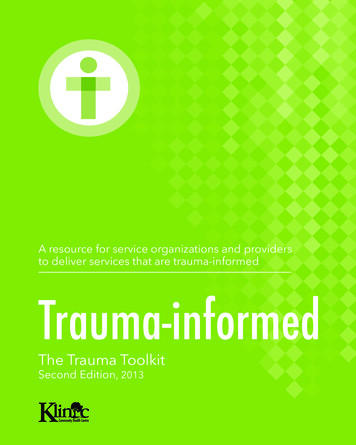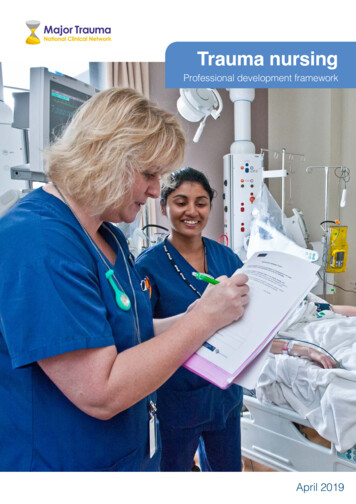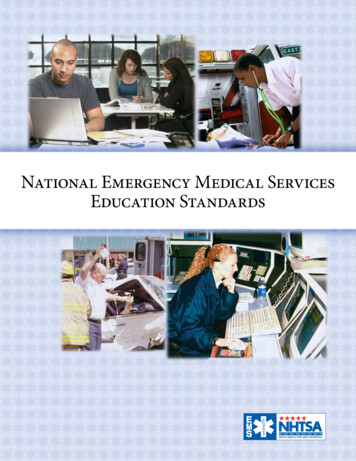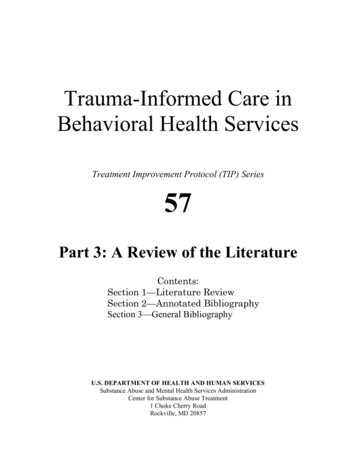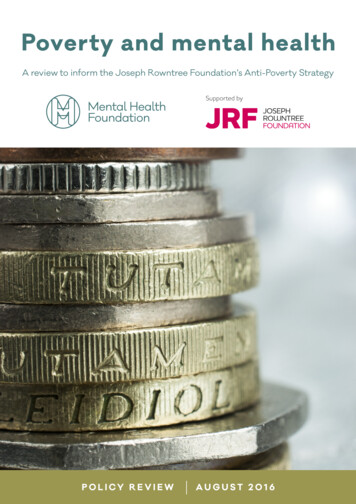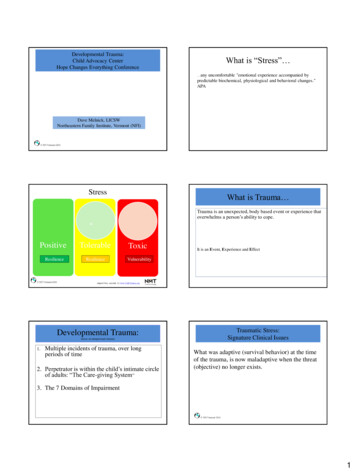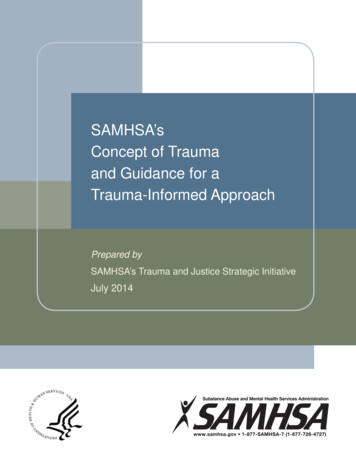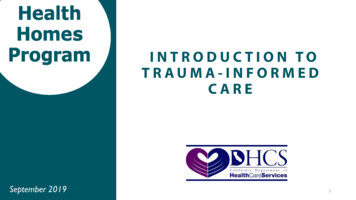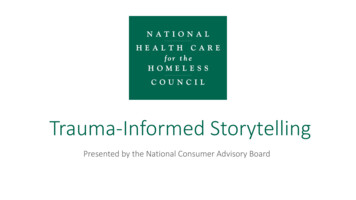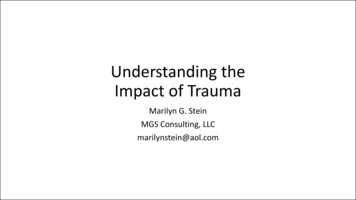
Transcription
Understanding theImpact of TraumaMarilyn G. SteinMGS Consulting, LLCmarilynstein@aol.com
Healthy People People whose integrity has not been damaged in childhood, whowere protected, respected, and treated with honesty by their parents,will be - both in their youth and in adulthood - intelligent, responsive,empathic, and highly sensitive. They will take pleasure in life and willnot feel any need to kill or even hurt others or themselves. They willuse their power to defend themselves, not to attack others. Alice Miller
To Bear Reality “Sometimes we encounter experiences that so violate our sense ofsafety, order, predictability and right, that we feel utterlyoverwhelmed. Unable to bear reality. We have come to call theseshattering experiences trauma.” Bessel A. van der Kolk, MD
Defining TraumaIndividual trauma results from an event, series of events or set of circumstancesthat is experienced by an individual as physically or emotionally harmful orthreatening and that has lasting adverse effects on the individual’s functioning andphysical, social emotional or spiritual well being. (SAMHSA 2012)Trauma Ignites Fight, flight or freeze response Re organizes the brain
Traumatization occurs when both internal and external resources are inadequateto cope with the external threat. (van der Kolk)CommunityFamilyExternalSpiritMindBodyInternal
Stress Learning to cope with stress is an important part of childdevelopment. When a young child’s stress response systems are activated within anenvironment of supportive adult relationships, these physiologicaleffects are buffered and brought back down to baseline. Extensive research on the biology of stress shows that healthydevelopment can be derailed by excessive or prolonged activation ofthe body’s stress response systems, with damaging effects onlearning, behavior and health.
Toxic stress Occurs when a child experiences strong, frequent and/or prolongedadversity—physical or emotional abuse, chronic neglect, caregiversubstance abuse or mental illness, exposure to violence and/or theaccumulated burdens of family economic hardship—withoutadequate adult support. The prolonged activation of stress response systems disrupts thedevelopment of brain architecture and other organs and increases therisk for stress-related disease and cognitive impairment.from the Harvard Center for the Developing Child, http://developingchild.harvard.edu
Toxic stress hijack’s the brainStressed children:cannot learncannot feelcannot calm downcannot get alongThe development of the human brain is use-dependent. The brain developsits structure in the first four years of life, depending on the experiences theenvironment offers the child. The brain of a child who has mostly lovingexperiences will develop differently from the brain of a child who has beentreated cruelly. Alice Miller
The results of Prolonged StressAdaptive changes in cognitionAdaptive changes in affectsAdaptive changes in behaviorAdaptive changes in neurophysiologyAdaptive changes in physiology
Traumatic eventProlongedAlarmReactionAlteredNeuralSystems
The first 1000 days(includes 9 months prior to birth) There are critical periods in the developing brain when it is open to development.Than it closes and an opportunity may be missed. The developing brain is constantly responding to its environment. The brain’s priority is survival in its environment. Enriched environments provide for optimal development. (ie:higher iq’s) The first 1000 days of life are a critical period.
Fetuses are busy“All of our senses are fully installed and are test driven pre-birth.”(Ghosts In the Nursery. pg 55) Touch: active at 17 weeks Taste: 15 weeks Hearing: 24 week Vision: 16 weeks (light sensitivity)The expectant mom’s stress, drug use, malnourishment, mental health andexperience of trauma strongly impact emotional development whichhampers healthy emotional regulation throughout life.
Bottom to Top Development
The Autonomic Nervous SystemSympatheticParasympathetic It is a nice, sunny day.you are taking a nice walk inthe park. Suddenly, an angry bear appears in yourpath. Do you stay and fight OR do you turn and runaway? It is a nice, sunny day.you are taking a nice walk inthe park. These are "Fight or Flight" responses. In thesetypes of situations, your sympathetic nervoussystem is called into action - it uses energy - yourblood pressure increases, your heart beats faster,and digestion slows down. This time, however, you decide to relax incomfortable chair that you have brought along.This calls for "Rest and Digest" responses. Now isthe time for the parasympathetic nervous to workto save energy - your blood pressure decreases,your heart beats slower, and digestion can start.
The Alarm State A frightened child doesn’t focus on the words They attend to the threat related signals in theirenvironment– the nonverbal signs of alarm eye contact facial expression body posture
Trauma results in an alienation from the body and a reduced capacityto be present in the here and now. Although exact prevalence estimates vary, there is a consensus in thefield that most consumers of mental health services are traumasurvivors and that their trauma experiences help shape theirresponses.
Adverse Childhood Experiences (ACE) Adverse childhood experiences, or ACEs, are broadly defined as incidentsduring childhood that harm social, cognitive and emotional functioning. Adverse childhood experiences (ACEs) include abuse, neglect and a rangeof household dysfunction such as witnessing domestic violence, or growingup with substance abuse, mental illness, parental discord, or crime in thehome. ACEs are strongly related to development and prevalence of a wide rangeof health problems, including substance abuse, throughout the lifespan. Over time, and often during adolescence, the child adopts copingmechanisms, such as substance use. Eventually, this contributes to disease,disability and social problems, as well as premature mortality.
Higher cumulative ACE scoreshave been shown to Increase the odds of smoking, heavy drinking, incarceration, and morbidobesity. Increase the risk for poor educational and employment outcomes andrecent involvement in violence (Bellis, Lowey, Leckenby, Hughes, &Harrison, 2013). Significantly increase the odds of developing some of the leading causes ofdeath in adulthood, such as heart disease, cancer, chronic lung disease,skeletal fractures, and liver disease. Prior studies have shown that for children who have experienced four ormore ACEs, the odds of having one of the above-mentioned negativehealth outcomes in adulthood are up to 12 times greater than those ofchildren who have not had such exposure (Felitti et al., 1998).
ACE Study categories1. recurrent and severe physical abuse2. recurrent and severe emotional abuse3. contact sexual abuseGrowing up in a household with:4. an alcoholic or drug-user5. a member being imprisoned6. a mentally ill, chronically depressed, or institutionalized member7. the mother being treated violently8. both biological parents not being present
Trauma and Substance Use Disorders Many with substance use disorders have experienced trauma aschildren. Substance abuse predisposes people to higher rates of trauma due tohigh risk behaviors. Substance abusers who have experienced trauma have worsetreatment outcomes than those without trauma histories. More than half of the women seeking treatment have histories oftrauma.
DissociationDissociation Detached Numb Compliant Suspension of time De-realization Fainting
Hyper Arousal
Looking through a new lens“An entirely different way is being developed of viewing all kinds ofindividual and social misbehaviors and maladaptions, moving fromviewing as “sick” or “bad” or (or both) to injured . Bloom (1997)“What has happened to you?”rather than the customary“What is wrong with you?”
ResilienceTrusting in one’s abilityto manage the moment
References The Prevalence of Adverse Childhood Experiences (ACE) in the Lives of Juvenile Offenders; Michael T.Baglivio and Nathan Epps Florida Department of Juvenile Justice, Tallahassee, Florida, Kimberly Swartz University of Florida College ofMedicine/Levin College of Law, Gainesville, Florida, ,Mona Sayedul Huq University of Florida College of Health and Human Performance,Gainesville, Florida, Amy Sheer and Nancy S. HardtUniversity of Florida College of Medicine, Gainesville, Florida Ghosts in the Nursery The Body Keeps Score
Trauma results in an alienation from the body and a reduced capacity to be present in the here and now. Although exact prevalence estimates vary, there is a consensus in the field that most consumers of mental health services are trauma survivors and that their trauma experiences help shape their responses.

